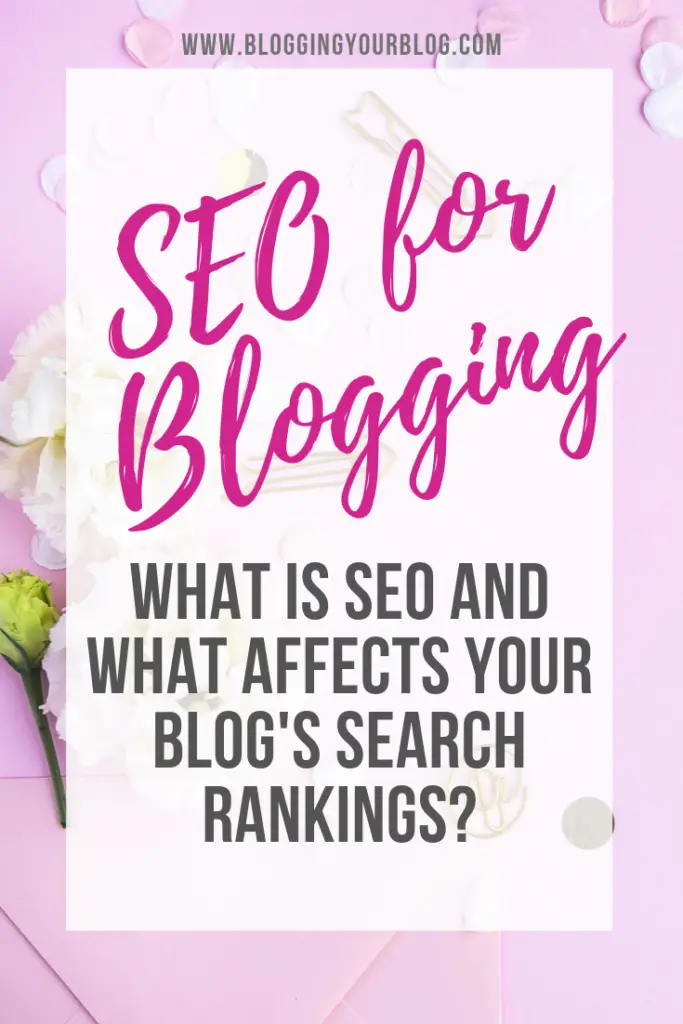This is post one in a series on SEO for blogging. As the SEO for blogging series goes on we will go more in depth on specifics.
I will preface this SEO for blogging post with the fact that I am NOT a SEO expert, I blog and build websites. I try to feed Google what it wants, and I’ve read up on SEO and tried to keep up with the MANY changes over the last 13 or so years. But if you really need an SEO guru, then you need to go to a site dedicated to SEO. I am just trying to help bloggers out with SEO for their blogs.
We will start this SEO for blogging series with a high up overview, since this is VERY in depth topic.
There are entire blogs, websites, and businesses created for this just for the sole purpose of mastering SEO for people and their websites.
The Google Monster can be intimidating, but you can and will wrangle it.
Prepare yourself though for some reading, and more reading, and even more reading if you want to get your head wrapped around this very big subjet.
Just remember like anything else with blogging, SEO for a website is a marathon and not a sprint. It can take a long time to get placement on the top of the results.
SEO is meticulous work, how else would people be able to run companies just to do this?

What is SEO?
SEO means “Search Engine Optimization”.
It is the process of increasing your blog’s visibility to people who use search engines.
SEO is also the process of having major search engines like Google, Yahoo, and Bing like you better than your competition or just like you and not think you’re a keyword farm.
Not being a keyword farm is important if you want good search rankings for your blog.
SEO is not what it used to be. SEO is constantly evolving.
For your blog to get a good spot in the unpaid search results of search engines when people are looking for stuff on the internet. This is what people are talking about when you get “organic” traffic to your blog, a search engine directed someone to your site because you made the search engine’s algorithm happy.
When you hear someone saying SEO for Google then they are talking about the specific algorithm that Google uses to decide what their search results will show.
Yahoo, Bing, and other search engines all use their own algorithms. If you specifically cater to Google then you might not be optimized in other search engines eyes.
But Google is king when it comes to search engines and the majority of search engine traffic will come from them. And since that is the Big Kahuna of search engines most SEO is geared towards what Google is looking for when it comes to a websites placement in the search results.
What is a Search Engine Algorithm?
To make an easy example, a Search Engine Algorithm is like a unique recipe that a search engine will use to determine how significant a website page is.
Each search engine uses their own series of unique formulas, combined together to determine if a web page is real or just spam. It will also determine if the web page has anything significant that people will be interested in.
Some of the things that search engines will have their “ingredient list” are:
- Keywords
- External Back-links
- Social Shares
- Internal Links
- Speed of the website
- Images
- URLs
- Visitor’s time on the site
- Bounce Rate
- Page views per visitor
- Site engagement
Each of these “ingredients” then has a formula of it’s own to determine how the search engine views the significance of that “ingredient”. All of these smaller formula results are used and then combined to determine the final results you see when you search a topic.
In more technical terms these “ingredients” could be called variables. And each of these variables is in fact it’s own algorithm.
Some search engines have more variables and some have less variables in their overall SEO algorithms.
Each search engine algorithm is usually kept very secret by the company that owns that algorithm. No one outside of the people who are in-charge of the algorithm really know what exactly each search engine uses and the importance they attach to each variable in the algorithm.
This adds more to the mysticism that surrounds SEO. SEO is pretty much based off of people gathering data, and trying to take a stab at what that specific search engine might be looking for.
Since Google is the king, most SEO revolves around what people find that Google is looking for in their algorithm.
Adding even more to the mysticism of search engine algorithms is the fact that search engines usually change up their algorithms two to three times a year. You can find the information on each Google update at Search Engine Land.
So once people have figured it out, it’s usually going to change soon.
With advances in technology the search engine algorithms get more advanced and take out some tricks that people will find to outsmart algorithms.
One example of algorithm changes: Back in the early 2000s you could go out and use duplicate content. Website owners would use article sites where you could use others articles as long as you gave attribution to the author. This worked great for getting content on your website. But it only lasted so long, technology got better, algorithms were then able to compare duplicate content. Sites that were using this tactic got penalized after algorithm updates. So as you can see, when people find one thing technology improves and everything can change very fast.
So What Can You Do for Your Blog’s SEO?
When it comes to SEO for blogging you need to use steps to help your blog post be seen and liked by the search engines, but also be readable and enjoyable for your readers.
Lets review some things you can do to help with your Blog’s SEO when creating your content.
Don’t worry about specific details of all these points right now, we will have more posts in this series coming up to help with the nitty gritty of the more detailed topics for SEO.
I will add links as the series goes along in the series so you can easily find them.
Post #2: SEO for Blogging Keyword Research for Blogs
Post #3: SEO for Blogging: SEO for Blog Posts
Make Sure Your Site is Fully Functional and Useful for Higher SEO Rankings
You need to make sure your site has clear and easy navigation and no broken links. Search engines will knock you down for these things.
You can use this Free Broken Link Checker to check and make sure your site is up to par on links. It’s a good idea to check this regularly as sometimes sites you link to could change their URLs, and you don’t have control over the fact that they properly used forwarding on their changes they’ve made.
If you are using WordPress for your blog you can also use plugins for checking for broken links on your blog. Broken Link Checker is a very popular plugin for this.
The user experience if very important. If it is poor and people who end up on your site jump right back off your site, this is bad in Google’s eyes.
This is what is called bounce rate. High bounce rate means people are not staying on your site. In turn Google interprets this as you site is not useful to visitors since they are not staying.
If users don’t spend too long on your site this can be another ding against you, so make sure users can easily navigate your site easily and they don’t get frustrated and leave.
Choose the Right Look for Your WordPress Blog
Help Your Blog SEO by Doing Keyword Research
Back in the day, you could just spam your keyword all over your page and search engines would send people to you in droves.
As technology improved, search engine algorithms got more complex, and therefore smarter. This made it where you have to do more than try every chance you could to get you keyword somewhere.
You have to research your keywords these days.
You need to determine which keywords target your blog post, or the subject you are about to make a post about. You then have to make a good blend of keyword targeting in your post to satisfy both your readers and the search engines.
Keyword research for your blog’s content will help answer things like:
- What topics/questions people are searching for in your blog’s niche?
- How many times per day or month are people searching for this?
- What words are people using when searching for the information?
- What are the long tail keywords on this topic that people search for?
Our next post in this series will cover this more in-depth and we’ll have some great keyword research tools for you to use for this.
Post #2: SEO for Blogging Keyword Research for Blogs
You Need High Quality Links for SEO
Basically all search engines rely on in-bound links as a way to determine the quality and relevancy of a site. Search engines use links to crawl through the web and discover new sites and pages. So you want to concentrate on getting high quality links for the SEO of your blog.
Link backs from sites that aren’t of good quality will hurt your blog in the long run.
The same goes for outbound links from your site. If you are allowing spammers to comment on your blog just because you want comments and those spammers are linking back to low quality sites, this hurts your blog’s SEO.
Make sure your links out to other sites in your posts are good quality links to reputable sites.
Keep Your Blog Content Up to Date
Search engines now rank based on the best quality and content that is fresh. You can no longer just put up content on your blog and let it sit for 5 years raking in money from AdSense. Those days are gone.
You have to keep returning to your content from the past and make sure you freshen it up.
Search engines now want to make sure top ranking sites are always providing the best information.
So if you feel like you wish you added some information to a post from a week, a month, or even a year ago, go update it and get that info on there.
Build a Brand to Help Your SEO Rankings
Building a brand is not something that is talked about much in SEO how to guides. But brand quires are important for Google ranking. It is what sets your site apart form the others. Are people searching for your brand?
So for instance, it helps BloggingYourBlog more if someone searches BloggingYourBlog SEO instead of SEO for blogging and ends up on this post. That in turn would make it more likely that this post would rank higher up for SEO for blogging.
Have High Quality In-Depth Content
Make sure your blog posts are high quality and in-depth. You don’t want your posts to be too short, but also you don’t want them to be too long and ramble on needlessly.
Yes the longer the post, the longer your readers will stay on your site. And that’s a good thing.
BUT. The longer the post, the more tendency you could have to ramble on trying to reach whatever the word count is that you read on an SEO post.
That will not keep your visitors, and they will leave, thus increasing the bounce rate and decreasing the time on your site.
Why You Should Be Posting Your Best Content Now
For my posts I tend to make sure at least 800 words, and then let it go up from there. Sometimes that is all I can manage, other times a topic (like this one) is so in-depth that reaching 2000 words is easy to do, and I actually find myself trying to trim the word count down some.
Be Adaptable to SEO Changes
It might be surprising but many people are not adaptable to SEO changes. For instance some people still just try to stuff keywords in their blog posts and hope they rank. This doesn’t work anymore.
Other people will copy content. If you want to make sure Google never lets people see your site, that’s a good way to do it.
SEO changes a few times each year, and you need to be able to change with it.
Go back and audit previous posts. Make sure they are meeting the SEO criteria for the current search engine algorithms and not last years.
Look at what is coming in the future with technology, and how users will be trying to find information on the web. This way you are ready before it’s all the rage. A good example of this is Neil Patel’s post about voice search and how it will affect digital marketing.
So if you’re not up to date on the changes that are taking place with technology and it’s uses you will not be able to do well in the long run with SEO for your blog.
Not adapting to the search engine’s algorithm changes and changes in technology will leave you behind and at the bottom in search engine rankings.
Post Structure
You want to make sure your blog posts are structured to help your SEO rankings.
Have your main keywords in your title, URL, image titles, and meta description.
Make sure your title will help with click through ratios. Search engines also gauge click through ratios in search rankings. If people scroll past the first few results and choose to click on yours instead, this says that your content is possibly more relevant and therefore will be bumped up.
Don’t click bait people though. That will just frustrate them and cause your bounce rate to go up, thereby signalling that it is in fact not better content than the other sites in the search results.
Post #3: SEO for Blogging: SEO for Blog Posts
Site Maps
Are you using a sitemap?
A sitemap is a list of URLs on your site. Search engine crawlers use sitemaps to find and index your website’s pages and contents.
A sitemap is one of the easiest ways to make sure search engines are finding your website’s pages.
You can build and submit a sitemap to Google here.
Engagement on Your Blog
Shout Me Loud did an article where they conducted testing themselves by removing comments and seeing how it affected their traffic.
They found that comments on blogs have a significant impact on the ranking of individual posts.
There is no definitive answer as to why this is and search engines have never come out and said that they do in fact factor in comments and interaction in the search engine algorithms, but the proof is in the pudding.
Theories for this range from showing the search engine that people like the content, to the fact that it adds more words to the page and in turn more keyword focus.

So as you can see, there are MANY details that go into SEO and getting your blog to rank highly on search engine results.
We just touched on the major factors, there are many more theories about minute details that could affect how your site is ranked.
But with all the cloak and daggers when it comes to search engines and their algorithms they clutch to so tightly to keep secret, it all comes down to what data can provide.
The next post in the series we’ll visit Keywords and tools you can use to help you with your keyword research and placement on your blog posts.



This is such a useful post with so many good tips! Thanks for sharing
These are very helpful tips! I continually try to read articles on SEO, and I always seem to learn something each time. Thank you for sharing!
Glad the SEO info was helpful for you 🙂
This is the first I heard about sitemaps. I am definitely going to look into it. Thanks for sharing these tips.
This was so helpful! I’m just beginning to learn about blogging and SEO and this great information.